Renault Trafic
| Renault Trafic | |
|---|---|
 | |
| Overview | |
| Manufacturer | Renault |
| Production | 1980–present |
| Body and chassis | |
| Class | Light commercial vehicle (M) |
| Body style | Van Minibus Pickup truck |
| Layout | FF layout (FR layout and 4x4 available for the 1st generation model) |
| Chronology | |
| Predecessor | Renault Estafette Bedford/Vauxhall Midi (for Vauxhall models) |
| Successor | Citroën-based Opel/Vauxhall Vivaro/Fiat Scudo (for Opel/Vauxhall and Fiat models) |
The Renault Trafic is a light commercial van produced by the French automaker Renault since 1980. It is also marketed as the Fiat Talento, the Nissan NV300 (previously, Nissan Primastar), the Mitsubishi Express and, until the model year of 2018, as the Opel/Vauxhall Vivaro (previously, Opel/Vauxhall Arena).
Previous versions of the Renault Trafic have been sold under Inokom, Chevrolet and Tata badges.
The third generation Vauxhall Vivaro was produced in GM Manufacturing Luton plant starting in 2013.[1] However, following the takeover of Opel/Vauxhall by Groupe PSA, the Trafic-based Vivaro went out of production in 2018, and was replaced by the next generation Vivaro based on the EMP2 Platform for the 2019 model year.
First generation (1980)[]
| First generation | |
|---|---|
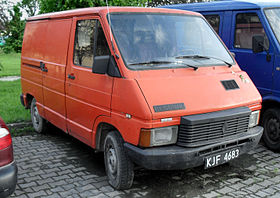 | |
| Overview | |
| Manufacturer | Renault |
| Also called | Opel Arena Vauxhall Arena Chevrolet Trafic Chevrolet Space Van Winnebago LeSharo Inokom Permas Tata Winger |
| Production | 1980–2001 1995–2004 (China)[2] |
| Assembly |
|
| Body and chassis | |
| Class | Light commercial vehicle (M) |
| Body style | 4/5-door van 2-door pickup truck 5-door minibus |
| Layout | FF layout, FR layout, 4x4 |
| Related | Renault Master Tata Winger |
| Powertrain | |
| Engine |
|
| Transmission |
|
| Chronology | |
| Predecessor | Renault Estafette Vauxhall Midi (Vauxhall models) |

The original Renault Trafic was sold from 1980 to 2000, and was somewhat revised and updated during its lifetime.[4]
Originally, the van had some variations in the front end shape depending which engine was fitted, with the original 1397 cc motor fitting behind a flat grille, and the 2.1 litre diesel engine and larger 1647 cc petrol engines requiring an extended plastic grille and deeper bumper.
The 1721 cc OHC engine replaced the 1647 cc OHV unit in the mid 1980s, which fitted under the shorter grille, but required a small lump in the bonnet. The diesel and 2.2 petrol carried on with the extended grille.
In the end of 1984, a four-wheel drive version was introduced. This was a part time system coupled with the diesel engine and a five speed manual transmission. This model operated as a front wheel drive until the rear wheels were engaged with a dog clutch, a system similar to the one used by Renault on the R18 4x4.[5]
In May 1989, the Trafic underwent a major front end facelift, with a rounder shape and a plastic bumper, and the new longer body shape covering all varieties of engine. In 1995, the Mk1 Trafic got its final facelift, with new grille, new tail lights, large double rear view mirrors, and a new interior with modern dashboard and multi adjustable seats.
This version was also sold as the Opel Arena from 1997.
Winnebago[]
The chassis and cab of the 1980s models were used as the base vehicle by Winnebago Industries to build the Winnebago 'LeSharo' from 1983,[6] and Itasca Phasar.
For the chassis and cab version to meet safety and emission requirements in the United States, this version was sold with Renault's J7T: 2,165 cc (2.2 L), and 2.1 litre diesel and turbo diesel engines, coded as J8S and shared with the 1985 to 1987 AMC/Jeep Cherokee/Commanche.
Note: Jeep versions used the Garrett T2 turbo and Winnebago's, the larger T3. C.A.R.B. granted a series of yearly waivers to Winnebago for the non compliance of fitting On Board Diagnostics (OBD I), and remained in effect throughout the model run from 1983 to 1992.
Campervan Variants[]
The Mk1 Trafic became popular for professional conversion into budget family motorhomes due to the flexibility of the design and the generous internal space for what was a relatively small van. Popular converters were Auto Sleepers and Holdsworth (now defunct). Other motorhome builders using the Trafic Mk1 as a base include Hymer, Elddis, Eriba, and Autostar.
Opel Arena[]
From 1997 to 2001, the Renault Trafic was marketed as the Opel Arena in Germany and as the Vauxhall Arena in the United Kingdom, the latter designed as a replacement for the Vauxhall Midi, which was the company's last full-size van, until the arrival of the Arena. The Midi itself replaced the Bedford CF van, which was also marketed as the Bedford Blitz in Germany.
Tata Winger[]
In June 2007, Tata Motors announced the introduction of the Winger, a panel van and minibus based on the 1995 to 2001 version of the Renault Trafic, but fitted with Tata's own two litre diesel engines, with or without turbo.[7]
Inokom Permas[]
The Inokom Permas was launched in Malaysia in 1998.[8] Production of the van was at Kulim District.[9][10]
South America[]
For South America, the vehicle was made in the Renault Argentina facility at Santa Isabel, Córdoba. In Brazil, it was badged as Chevrolet Trafic and later as the Renault Trafic or Chevrolet SpaceVan. A pickup version was sold as the Renault Trafic Rodeo. Production ended in 2002.
Gallery[]

Renault Trafic first generation (facelift) 4x4 version: The 4x4 has the rear axle set further forward than the FWD.
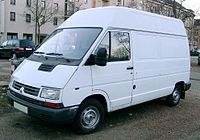
Renault Trafic first generation (second facelift) with high roof body

Renault Trafic first generation (second facelift) with high roof body

Opel Arena

Tata Winger (2007–)

Vauxhall Arena

1988 Winnebago LeSharo

1984 Renault Trafic Camper
Second generation (X83; 2001)[]
| Second generation (X83) | |
|---|---|
 | |
| Overview | |
| Manufacturer | Renault Opel/Vauxhall |
| Also called | Nissan Primastar Opel Vivaro Vauxhall Vivaro |
| Production | 2001–2015 |
| Assembly | United Kingdom: Luton (GM Manufacturing Luton) Spain: Barcelona (Nissan) |
| Body and chassis | |
| Class | Light commercial vehicle (M) |
| Body style | 4-door van/minibus 2-door pickup truck |
| Powertrain | |
| Engine | petrol 2.0 MR20DE I4 diesel 1.9 F9x I4 2.0 M9R I4 2.5 G9 I4 |
| Transmission | Manual 6-speed Automatic 6-speed Quickshift |
| Dimensions | |
| Wheelbase | SWB: 3,098 mm (122.0 in) LWB: 3,498 mm (137.7 in) |
| Length | SWB: 4,782 mm (188.3 in) LWB: 5,182 mm (204.0 in) Regular Pickup: 5,038 mm (198.3 in) Crew Pickup: 5,438 mm (214.1 in) |
| Width | 1,904 mm (75.0 in) |
| Height | Crew Van: 1,380 mm (54.3 in) SWB: 2,497 mm (98.3 in) & 2,400 mm (94.5 in) LWB: 2,800 mm (110.2 in) Pickup Regular: 1,966 mm (77.4 in) Pickup Crew: 1,973 mm (77.7 in) |
The second Trafic resulted from a joint venture between German Opel, Japanese Nissan, and French Renault. It is also sold as an Opel/Vauxhall Vivaro and Nissan Primastar.
Designed by Renault's corporate design department based within the company's Technocentre outside Paris, the Trafic was developed by the engineering team of Renault's light commercial vehicle unit at Villiers-Saint-Frédéric. Manufactured by GM Manufacturing Luton at its plant in Luton — beside Primastar and the Vivaro — the Trafic was the first Renault vehicle to be built in the United Kingdom in more than thirty years.[11][12]
In an agreement between Renault and Nissan, versions of the van are also manufactured at Nissan's plant in Barcelona, Spain.[13] In particular, high roof versions for Vauxhall, Renault, and Nissan are made in Barcelona because the Luton assembly plant has a low roof which cannot accommodate the extra height of the high roof.
The van exists in several versions, from a three seater with all the rear space available for loads, to a nine seater. Its name is based on the French word for "trade" or "traffic" (depending on the context). The van was designed by Renault in Paris, and both Renault and Opel versions are manufactured by Opel at their plant in Luton.[13] In 2012, production of the Vauxhall Vivaro totalled 36,982 and 16,483 for the Renault Trafic.[14]
A mild facelift in October 2006 had the orange indicators swapped for clear ones, which were more integrated into the headlamp housings. On the Opel model, the indicators moved from the front bumpers, up into the headlamp housings, thus looking more similar to the Renault. Production ended in June 2015.
Gallery[]

Renault Trafic second generation (before facelift)
Renault Trafic second generation (before facelift)
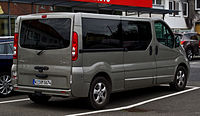
Renault Trafic second generation (phase 2 facelift)
Nissan Primastar[]
The Nissan Primastar was also launched in 2001, and is available in panel van, combi, bus, and chassis cab configurations. Two wheelbases and two roof heights are available, as well as three diesel engines and a petrol. In the end of 2014, the last Primastar rolled off the production line. It was replaced by the NV300 in September 2016.
Gallery[]

Nissan Primastar with options including colour coded bumpers

Nissan Primastar, after facelift — note revised indicator lights
Opel Vivaro A[]
The Opel Vivaro from the German automaker Opel was launched in September 2001. While the Vivaro is sold as an Opel in most European markets, in the United Kingdom it was sold as a Vauxhall. The Vivaro is primarily manufactured at GM Manufacturing Luton (previously IBC) in Luton, England and by Nissan at their Zona Franca (Barcelona) facility in Spain.
The Vivaro is available in panel van, minibus, combined bus/van, and platform crew cab configurations. Two different wheelbase styles, and two roof height options are also available, as well as three diesel engine power options and a petrol engine.
The vehicle was given a mild facelift in 2006, during which the front indicators were moved from the front bumper, up into the headlight housing and only a 2.0 L four cylinder diesel engine is available in two states of tune; a 90 PS (66 kW; 89 bhp) or 115 PS (85 kW; 113 bhp)[15] mated to a six speed manual or optional automatic transmission.
The Vivaro e Concept debuted September 2010 at the IAA Commercial Vehicle Show in Hanover, Germany.[16] It is plug in hybrid vehicle, with an extended range up to 250 mi (402 km) and includes 21 kWh lithium ion batteries enabling over 60 mi (97 km) of pure electric driving range.[17][18]
Gallery[]
Pre facelift Opel Vivaro (2001–2006)
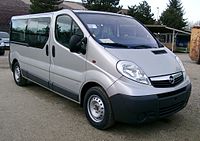
Facelift Opel Vivaro (2006–2015)
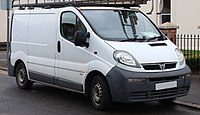
Pre facelift Vauxhall Vivaro (2004)

Facelift Vauxhall Vivaro (2012)

Opel Vivaro E-Concept (2009)
Engines[]
| Petrol engines | |||
|---|---|---|---|
| Model | Engine type | Power | Torque |
| 2.0 | 1,997 cc (122 cu in) I4 NA | 120 PS (88 kW; 118 hp) | 190 N⋅m (140 lb⋅ft) |
| Diesel engines | |||
| Model | Engine type | Power | Torque |
| 1.9 dCi | 1,870 cc (114 cu in) I4 turbo | 80 PS (59 kW; 79 hp) | 190 N⋅m (140 lb⋅ft) |
| 1.9 dCi | 1,870 cc (114 cu in) I4 turbo | 100 PS (74 kW; 99 hp) | 240 N⋅m (177 lb⋅ft) |
| 2.0 dCi | 1,995 cc (122 cu in) I4 turbo | 90 PS (66 kW; 89 hp) | 242 N⋅m (178 lb⋅ft) |
| 2.0 dCi | 1,995 cc (122 cu in) I4 turbo | 115 PS (85 kW; 113 hp) | 290 N⋅m (214 lb⋅ft) |
| 2.5 dCi | 2,464 cc (150 cu in) I4 turbo | 150 PS (110 kW; 148 hp) | 320 N⋅m (236 lb⋅ft) |
Third generation (X82; 2014)[]
| Third generation (X82) | |
|---|---|
 | |
| Overview | |
| Manufacturer | Renault Opel/Vauxhall |
| Also called | Fiat Talento (2016–2020) Mitsubishi Express (Australia & New Zealand) Nissan NV300 (2014–2021) Nissan Primastar (2022–present) Opel Vivaro (2014–2018) Vauxhall Vivaro (2014–2018) |
| Production | 2014–present |
| Assembly | France: Sandouville (Sandouville Renault Factory) United Kingdom: Luton (IBC Vehicles Ltd) (Vauxhall and Opel, 2014–2018) |
| Body and chassis | |
| Class | Light commercial vehicle |
| Body style | 4-door van/minibus |
| Powertrain | |
| Engine | diesel 1.6L R9M I4 2.0L M9T I4 |
| Transmission | Manual 6-speed Automatic 6-speed Quickshift |

Renault released a new generation in September 2014. It is again also sold by Opel in Europe.
Opel/Vauxhall variants for the United Kingdom and mainland Europe, continue to be manufactured at GM Manufacturing Luton, except for the high roof variants, which are manufactured at Sandouville. This new model drops the previous larger capacity diesel engines, in favour of a 1.6 Energy dCi (Renault)/CDTI (Opel) engine. From 2016, Vauxhall Vivaro models gained a Made In Britain badge at the rear.[19]
Two lower power variants (90 PS and 120 PS) use a variable geometry turbocharger, while the highest output (140 PS) variant employs a twin turbocharger arrangement; other features include variable output water and oil pumps and a maintenance free timing chain.[20]
In July 2016, Fiat introduced a rebadged Trafic, called Talento to replace its Scudo).[21] In October 2020, Renault announced it would stop supplying Talentos to Fiat ahead of the planned merger of the latter's parent company with Groupe PSA.[22]
The Opel/Vauxhall Vivaro went out of production in 2018, as a result of the takeover of Opel/Vauxhall by Groupe PSA; it was replaced by a new generation Vivaro based on the Citroën Jumpy for the model year of 2019.
In 2020, the Trafic was rebadged and introduced as the third generation Mitsubishi Express for Australia, and as a replacement for the former L300 in the New Zealand market. The existing Renault Trafic has also been sold in these markets since 2014.[23]
Gallery[]

Renault Trafic (facelift)

Nissan NV300
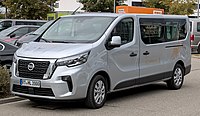
Nissan NV300 (facelift)
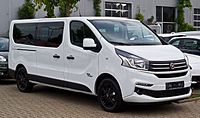
Fiat Talento

Opel Vivaro B
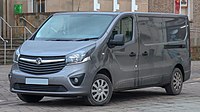
Vauxhall Vivaro

Mitsubishi Express
Engines[]
| Diesel engines | |||
|---|---|---|---|
| Model | Engine type | Power | Torque |
| 1.6 dCi | 1,598 cc (98 cu in) I4 turbo | 95 PS (70 kW; 94 hp) | 260 N⋅m (192 lb⋅ft) |
| 1.6 dCi | 1,598 cc (98 cu in) I4 turbo | 125 PS (92 kW; 123 hp) | 320 N⋅m (236 lb⋅ft) |
| 1.6 dCi | 1,598 cc (98 cu in) I4 turbo | 145 PS (107 kW; 143 hp) | 340 N⋅m (251 lb⋅ft) |
| 2.0 dCi | 1,997 cc (122 cu in) I4 turbo | 120 PS (88 kW; 118 hp) | 320 N⋅m (236 lb⋅ft) |
| 2.0 dCi | 1,997 cc (122 cu in) I4 turbo | 145 PS (107 kW; 143 hp) | 350 N⋅m (258 lb⋅ft) |
| 2.0 dCi | 1,997 cc (122 cu in) I4 turbo | 170 PS (125 kW; 168 hp) | 380 N⋅m (280 lb⋅ft) |
References[]
- ^ "Luton immediate future secure as Vauxhall confirms Vivaro build". Just Auto. 24 March 2012. Retrieved 12 April 2012.
- ^ "Spotted In China: Sanjiang Renault Trafic Times Two - CarNewsChina.com". CarNewsChina.com. 1 December 2016. Retrieved 8 May 2018.
- ^ Walker, Alan (September 1982). Kennett, Pat (ed.). "The great European retreat". TRUCK. London, UK: FF Publishing Ltd: 37.
- ^ "Sandouville: new plant, New Trafic and 50 years of excellence". media.group.renault.com. Retrieved 18 August 2019.
- ^ Verhelle, Tony (7 February 1985). "63e salon voor bedrijfsvoertuigen: Geen schokkende dingen" [The 63rd commercial vehicle exhibition: Nothing shocking]. De AutoGids (in Dutch). Brussels, Belgium: Uitgeverij Auto-Magazine. 6 (140): 18.
- ^ "Curbside Classic: 1985 Winnebago". Truth about cars. Retrieved 15 January 2012.
- ^ "Tata Motors says holding margins a challenge". Reuters. 18 June 2007.
- ^ David Ong-Yeoh (14 July 1998). "Inokom launches first van" (PDF). library.perdana.org.my. Archived from the original (PDF) on 28 July 2017. Retrieved 28 July 2017.
- ^ "Inokom confident of selling 30 one-tonne vans per month". blis2.bernama.com. 8 December 1998. Archived from the original on 28 July 2017. Retrieved 28 July 2017.
- ^ http://autoworld.com.my/news/2001/11/07/New-Inokom-Vehicle-to-Be-Introduced-in-mid-2002/
- ^ "New Renault Trafic voted International Van of the Year 2002". Renault. 2002. Archived from the original on 8 June 2011.
- ^ "History & Heritage". Vauxhall Motors Ltd. Company Profile. General Motors. Archived from the original on 11 February 2009. Retrieved 24 September 2011.
GMM Luton Vehicles is also based in Luton. Its Vivaro medium sized van is produced for sale under the Opel/Vauxhall, Nissan and Renault brands.
- ^ a b "New Renault Trafic voted International Van of the Year 2002" (Press release). Renault. 1 January 2002. Archived from the original on 8 June 2011.
- ^ "Facts and Figures 2012" (PDF). Adam Opel. p. 36. Retrieved 15 August 2013.
- ^ "Vauxhall Vivaro: Technical Data". Vauxhall. Retrieved 10 April 2012.
- ^ "Visitors: IAA – Internationale Automobil-Ausstellung". Iaa.de. Archived from the original on 15 June 2008. Retrieved 2 October 2010.
- ^ "Vauxhall reveals range-extended van". TheGreenCarWebsite.co.uk. 21 September 2010. Retrieved 2 October 2010.
- ^ "Discussion about the battery capacity". The Green & Energy Consulting Group. 8 November 2010. Archived from the original on 14 March 2012.
- ^ http://www.perrys.co.uk/car-news/news/vauxhall-joins-made-in-britain-campaign/
- ^ Dallas, James (24 September 2013). "Vivaro production keeps on rolling". WhatVan?. Retrieved 4 August 2014.
- ^ "Fiat Talento van review". Auto Express.
- ^ Reuters Staff (23 October 2020). "Renault to end van collaboration with Fiat ahead of Fiat/PSA deal". Reuters. Retrieved 26 October 2020.
- ^ https://www.motoring.com.au/mitsubishi-express-to-return-115560/
External links[]
| Wikimedia Commons has media related to Renault Trafic. |
- Renault Trafic official website
- The original Renault Trafic as a camper van (includes a photo of the original Trafic, pre-facelift)
- Opel Vivaro official website
- Renault vehicles
- Vans
- Minibuses
- Road vehicles manufactured in the United Kingdom
- Vehicles introduced in 1980

























